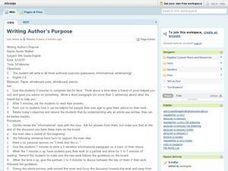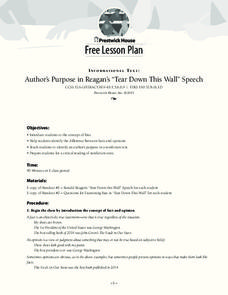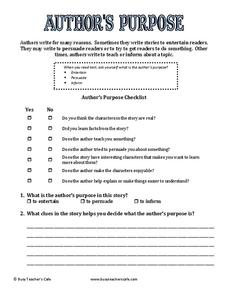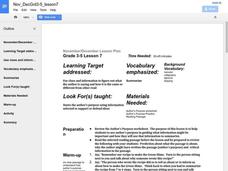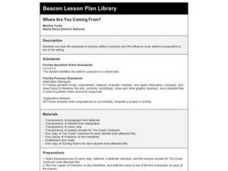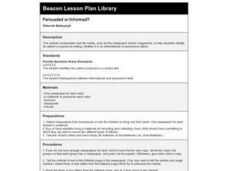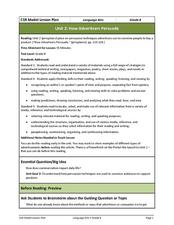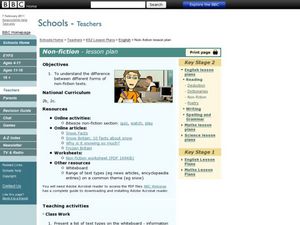Curated OER
Lesson 4: Author's Purpose
Learners identify the author's purpose in various poems from the book Words with Wings: A Treasury of African-American Poetry and Art. In order to determine the purpose, pupils first observe as the teacher completes a PIES char...
Curated OER
Writing Author's Purpose
Write in all three authorial purposes (persuasive, informational, entertaining) with this lesson. Young writers consider a time when a friend of theirs helped them out and gave them advice on something. They write a short paragraph (no...
Teach-nology
The Purpose of Summaries
How can you tell the author's purpose from just a short summary? Kids read three different summaries of books to determine whether the author meant to entertain, persuade, or inform.
Read Works
Changing An Author's Purpose
Some write to inform, and others to persuade. Show your class the difference between these two purposes with the instructional activity and sample essays provided here. First, model how you might change a few words in order to present a...
Prestwick House
Author’s Purpose in Reagan’s “Tear Down This Wall” Speech
President Ronald Reagan's "Tear Down This Wall" speech, delivered on June 12, 1987 before the Berlin Wall, provides class members with an opportunity to examine three key aspects of informational text: author bias, the use of facts and...
Curated OER
What's My Point: Persuasive Writing
Why do readers need to know an author’s purpose? How do you figure out what that purpose is? Guide your pupils through a series of activities that show them how to identify various techniques and structures used in persuasive writing....
Florida Center for Reading Research
Comprehension: Text Analysis, Persuade, Inform, and Entertain Sort
Why do authors write? Practice determining the author's purpose with a categorizing activity. Learners sort twelve short passages into three categories: persuade, inform, and entertain.
Curated OER
Lesson 1: Identifying an Author's Purpose
Different types of text are written for very different reasons. Learners discuss the differences in writing to entertain, to inform, and to persuade their audiences. They work on identifying the author's purpose by reading and charting...
Curated OER
Categorizing Texts According To Author's Purpose
Young scholars categorize books into the 3 different kinds of author's purpose. In this author's purpose lesson plan, students categorize them into the categories of entertain, inform, and persuade.
Curated OER
Author's Purpose
In this assessing the author's purpose worksheet, students determine whether the author wrote to entertain, persuade, or inform by checking yes and no boxes, identifying the purpose, and listing clues that helped determine the purpose....
Curated OER
Author's Purpose
Fifth graders determine the meaning of author's purpose. In this author's purpose lesson, 5th graders apply the PIE (persuade, inform, entertain) strategy to determine why an author wrote a piece of writing. They examine passages and...
Curated OER
Where Are You Coming From?
Pupils examine and discuss author's purpose and the influence of an author's perspective in his or her writing. In groups, they read scenarios and respond to them from the perspective of a designated character. Materials are attached.
Curated OER
My Name is___________.
Read to gain an understanding of the author's intent or purpose. Learners analyze a persuasive text, identify the author's purpose, and evaluate the claims used as support. They then compose a persuasive essay of their own.
Curated OER
Persuaded or Informed?
Give each learner a newspaper for this activity! As a group, read select editorials and discuss them with your class. Are these articles informational or persuasive? Cut out select editorials and have learners identify the purpose of...
Curated OER
How Advertisers Persuade
This plan centers around the article "How Advertisers Persuade," although it is not included in the instructional activity itself. Get your class thinking about advertising, appeals, and techniques that companies use to get their...
Curated OER
Non-Fiction Texts
Third graders examine different types of non-fiction texts. In this non fiction lesson, 3rd graders use different types of texts to gather information. Students work in groups to analyze the texts for author's purpose, common themes, and...
Newseum
Persuasion Portfolios
After class members brainstorm a list of current social and political issues, groups each select a different topic from the list to research. Teams create a portfolio of at least 10 examples of stories about their issue, stories that...
Curated OER
Identify Author's Purpose
In this author's purpose worksheet, students complete a graphic organizer, writing clues that help determine author's purpose in an essay: explain, express feelings, persuade or entertain.
Curated OER
Author's Purpose
Determining an author's purpose can help readers understand a text more deeply. Using a PIES chart (persuade, inform, entertain, share) and poems from Leaf by Leaf: Autumn Poems by Barbara Rogasky, class members organize lines that show...
Curated OER
Author's Purpose and Point of View Post Test
For this author's purpose and point of view worksheet, students determine the definition of the terms and identify the author's purpose and point of view in given passages.
Curated OER
Author's Purpose
In this worksheet on determining the purpose of writing, students read 3 short paragraphs and choose whether they were written to persuade, inform or entertain.
Curated OER
Summer of the Monkeys
While reading the book Summer of the Monkeys by Wilson Rawls, the class ties together the core reading objectives, which are making predictions, comprehending new information, reading for author's purpose, independence in reading, and...
Curated OER
Pourquoi Tales
Lead a web search for information on writers and discuss the craft of purposeful writing as a class. Your students investigate "pourquoi tales" which are "why" stories. and then write their own examples of pourquoi stories to share in a...
Curated OER
Marketing to Teens: Parody Ads
High schoolers deconstruct advertising messages by analyzing parody ads and exploring the purpose of satire. Then they create their own parodies based on real ads discussed in class. A creative activity to extend any study of media,...



